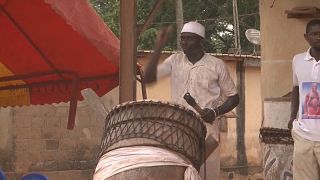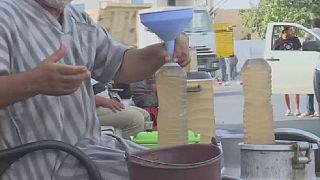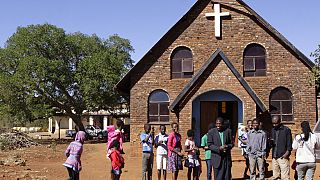Uganda
In Mbarara, southwester Uganda, Mzee Girino Ndyanabo keeps alive age-old traditions of local beer making.
The local brewer is among the few who still master this art.
Clasping a stick to balance himself, Mzee Girino Ndyanabo steps into a wooden boat filled with peeled bananas.
He steps on the bananas and starts to rhythmically pound them with his bare feet. He continually smashes the bananas as he adds some elephant grass into the mix.
At least once every week, Ndyanabo’s family converge around the pit in which bananas have been left to ripen.
The bananas are peeled and thrown into a wooden vat carved like a boat, into which the family patriarch steps with bare feet to press juice.
The sweet juice is filtered and sprinkled with grains of sorghum, and then left to ferment for 12 to 24 hours.
The result: an alcoholic beverage Ugandans call tonto, or tontomela, a Luganda word that alludes to drinkers' poor coordination.
Weaker than bottled beer, the drink has a fruity aroma and bits of sorghum floating on its dark surface.
“I started learning about the local brew way back when I was still young from my father. They would brew like how we have done it in the boat, but they would ferment it in a pot made from clay or using a calabash. Today, we leave the alcohol to ferment in the boat and once it matures, I ride to Mbarara to sell it,” says Ndyanabo.
Pressing concerns
Tonto's a traditional drink in Uganda, as old as the communities that make it.
Folk singers have crooned about tonto, and politicians grasping for a common touch take a sip when hunting for votes.
But its production is under threat as cheap bottled beer becomes more attractive to inflation-pressed drinkers and as authorities move to curb the production of what are considered illicit home brews.
As tonto production takes place outside official purview, authorities are unable to collect revenue from its sale.
A bill in the national assembly seeking to regulate the production and sale of alcohol would criminalize the activities of home brewers of tonto, along with other traditional brews made across this East African country.
Farmers have a more pressing concern, however, that not enough new banana juice cultivars are being planted to produce the brew.
In addition to moving long distances in search of bananas, the price of sorghum has gone up.
Ndyanabo also scavenges for the spear grass that he stomps upon in the banana-filled vat, straining to turn banana paste into clear juice.
“What would be here today, you sleep while you have cut the grass, with the ready matooke (banana paste), you fetch water, you roast sorghum and then you wait to make the local brew. Once you are ready to make the local brew, you get matooke. You put it in the boat with the grass then you start stepping on it. After bringing the juice then you pour in water when the boat is full with the sorghum you cover it and then come back after a few days to check on the fermentation process until it is ready for drinking," Ndyanabo says of the process.
One customer is Benson Muhereza, an electrician who regularly visits a small bar in a poor suburb of Mbarara.
There, under a temporary shelter erected against the wall of a house, Muhereza and other patrons are served by a woman who's been in the tonto business for six years.
“Now people like our grandfathers and fathers they used to take tonto (local brew) but our generations we like waragi (cheap alcohol) because people don’t have money to spend on," he says.
Among farmers, however, a key concern is that communities are prioritizing the more commercially viable matooke - bananas that are boiled and eaten as a starchy mash - rather than tonto made with the bananas.
“Sustainable business”
“The people are not enjoying planting those plants where we get our local tonto (local brew). They are engaged in matooke to get money. People are not willing to plant and the people who were planting them, their land is no longer fertile for banana plantation,” Muhereza adds.
Christine Kyomuhangi, the tonto seller, said she receives two jerrycans of the home brew every day.
While she understands the threats to her business, she insists it is sustainable.
“I have been making a living and educating my children through selling alcohol,” Kyomuhangi says explaining the positive impact it has had on her family.
In order to sustain the practice, Ndyanabo has been involving his family, including little children, so they can learn the art of making the local brew.
The family makes five or six 20-liter jerricans in each batch. A jerrican's worth sells for about $8. A half-liter of tonto retails for about 27 cents.
A trader who supplies the nearby city of Mbarara swings by every week to fetch the fresh tonto brew.
For Ndyanabo, the earnings from making and selling tonto have helped look after his family over the years.













01:13
UK lawmakers pass bill seeking to gradually phase out smoking
01:02
Pics of the day: April 15, 2024
01:16
Kenya, Uganda to end oil import feud over licensing
03:22
Kalangala islands energy divide: struggle and potential for farmers
02:22
Bamboo farming in Uganda on the rise as gov't seeks to increase export
01:03
Uganda's president appoints son as top commander of the army